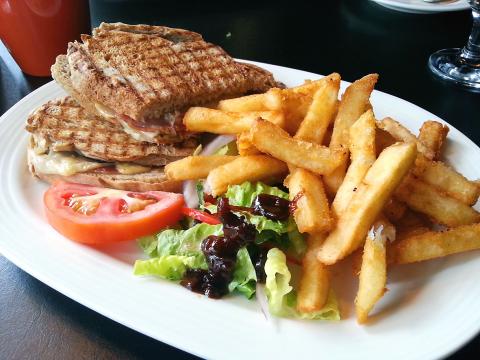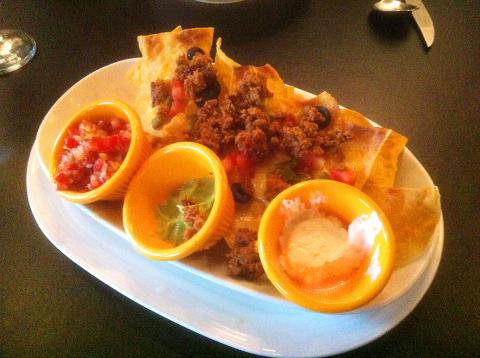You would be forgiven for thinking the menu at Toast Bar and Bistro was a clone of the menu at Carnegie’s, the popular expat restaurant and nightclub in Taipei.
Toast is run by two former Carnegie’s employees, Jonathan Wy (黃萬里) and Richard Uy (黃全利). Wy, the manager, and Uy, the chef, are Filipino-Chinese expats who helped create Carnegie’s current menu when they started working there during the late 1990s. In the meantime, they moved on to manage several different Western establishments in the city, and recently jumped on the opportunity to start their own venture. The restaurant and bar, which sports a modern, homey decor, opened six weeks ago.
If you’ve been disappointed at the quality and consistency of the food at Carnegie’s in recent times, as I have, it might be time to re-visit the source of that restaurant’s former glory. The meals on several recent visits to Toast have been very good, particularly the brunch and breakfast selections.

Photo: David Chen, taipei times
The eggs benedict (NT$230) is a fail-safe choice thanks to a brilliant twist: The restaurant uses prosicutto ham instead of plain ham or bacon. And it’s nice to see that even small side dishes aren’t neglected — the meal comes with a small salad consisting of fresh greens topped with a sweet and sour chutney, as well as a side of deep-fried potatoes, which the menu calls “Potato O’ Brien.” Never mind they’re not the real thing — chunks of potato pan-fried with green peppers and onion — these thin, coin-sized crinkle cut slices are still tasty and round out the meal nicely.
Other selections at Toast include familiar hangover-helper sets from two sides of the pond. The American breakfast (NT$320) comes with sausage, bacon, hash browns and two eggs made to order, while the English Breakfast (NT$320) adds baked beans, pan-fried tomatoes and mushrooms, and replaces the hash browns with crinkly-cut fried potatoes.
We liked the “Build Your Own Omelette” (NT$220), which diners can customize to their liking by choosing from a variety of meats, vegetables and cheeses to add as filling. The eggs are organic and they’re cooked properly — a refreshing change from the greasy mess served by Carnegie’s and many of the trendy brunch places around Taipei. The toast on the side was delicious. The restaurant makes all of its bread from scratch, which includes whole wheat and rye bread for sandwiches, dinner rolls and the dough for its stone-oven baked pizzas.

Photo: David Chen, taipei times
Wy and Uy originally envisioned opening a “gastropub,” a fancy version of a British-style pub serving gourmet food. They toned down that ambition a bit as Toast’s menu items aren’t particularly fancy or exotic, but it’s clear that much attention and care is given to preparing the food. The simple but delicious panini (NT$260) is a fine example. It’s easy to imagine this item, loaded with prosciutto (happily, again) and melted gouda cheese to the tasty bread and served with a side of French Fries and salad, becoming a favorite among regulars.
Wy and Uy naturally want customers to make repeated trips to Toast, and often, which explains the almost dizzying variety of more than 60 items on the menu. Carnegie’s regulars will notice their favorites — a long list of bar food staples, Mexican and pasta, but there is a fair number of new items recommended by the house, including Mexican fajitas (NT$280), Lamb Rogan Josh curry (NT$350), Belgian Mussels with Frites (NT$320) and a variety of 10-inch pizzas (NT$260 to NT$280).
The restaurant plans to launch weekly specials, with off-menu items such as Shepherd’s pie, Chicken Briyani and tacos, and offers happy hour specials on mixed drinks for NT$90 from 5pm to 8pm every day.
The comfy two-story space will also win repeat customers. Wooden floors and an interior design that mixes art deco and modern elements contribute to the Toast’s classy but casual atmosphere.
Wy, who often greets customers as they enter, sets the bar high for attentive and friendly service. In general his wait staff do a good job, though a few of the new waiters need to do some catching up.
But all in all, Toast is off to a good start — the only question, as with any new venture, is whether Wy and Uy can keep up the quality and maintain a steady clientele. Their ample experience in the business and the good and reasonably-priced food suggests they will.

April 14 to April 20 In March 1947, Sising Katadrepan urged the government to drop the “high mountain people” (高山族) designation for Indigenous Taiwanese and refer to them as “Taiwan people” (台灣族). He considered the term derogatory, arguing that it made them sound like animals. The Taiwan Provincial Government agreed to stop using the term, stating that Indigenous Taiwanese suffered all sorts of discrimination and oppression under the Japanese and were forced to live in the mountains as outsiders to society. Now, under the new regime, they would be seen as equals, thus they should be henceforth

Last week, the the National Immigration Agency (NIA) told the legislature that more than 10,000 naturalized Taiwanese citizens from the People’s Republic of China (PRC) risked having their citizenship revoked if they failed to provide proof that they had renounced their Chinese household registration within the next three months. Renunciation is required under the Act Governing Relations Between the People of the Taiwan Area and the Mainland Area (臺灣地區與大陸地區人民關係條例), as amended in 2004, though it was only a legal requirement after 2000. Prior to that, it had been only an administrative requirement since the Nationality Act (國籍法) was established in

Three big changes have transformed the landscape of Taiwan’s local patronage factions: Increasing Democratic Progressive Party (DPP) involvement, rising new factions and the Chinese Nationalist Party’s (KMT) significantly weakened control. GREEN FACTIONS It is said that “south of the Zhuoshui River (濁水溪), there is no blue-green divide,” meaning that from Yunlin County south there is no difference between KMT and DPP politicians. This is not always true, but there is more than a grain of truth to it. Traditionally, DPP factions are viewed as national entities, with their primary function to secure plum positions in the party and government. This is not unusual

US President Donald Trump’s bid to take back control of the Panama Canal has put his counterpart Jose Raul Mulino in a difficult position and revived fears in the Central American country that US military bases will return. After Trump vowed to reclaim the interoceanic waterway from Chinese influence, US Defense Secretary Pete Hegseth signed an agreement with the Mulino administration last week for the US to deploy troops in areas adjacent to the canal. For more than two decades, after handing over control of the strategically vital waterway to Panama in 1999 and dismantling the bases that protected it, Washington has